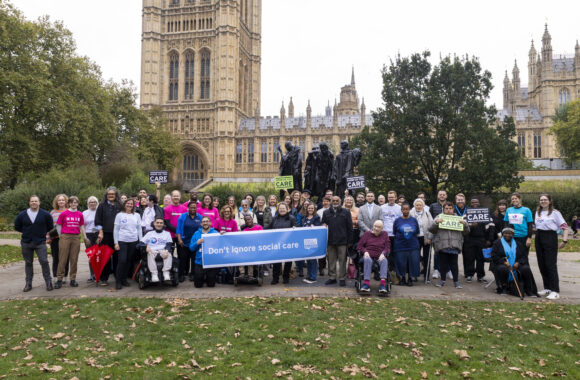
Career history
I didn’t know that I wanted to work in the social care sector. I was working in Claire’s Accessories looking for a graduate placement when I saw the graduate scheme at Look Ahead, as well as a receptionist role at one of Look Ahead’s larger services in Elephant and Castle – I applied for both. I got the receptionist job and started there, and later found out that I’d also been accepted onto the graduate scheme.
I left the receptionist job and started the graduate scheme, becoming a support worker. I got to choose two placements as part of the training so chose to work in a young people’s service in Slough and a homelessness service in Westminster.
I went in with the expectation of staying in young people’s services as this has been a passion of mine since university, but working in the homelessness service really clicked for me. The progress is slower in this type of service, but it gives you a chance to build relationships with the customers and see their lives change.
My manager at that time was a huge influence for me and, when my then Team Leader went on secondment, my manager encouraged me to apply for the team leadership position to cover the role. I really enjoyed the management position and, after my Team Leader returned, I was posted in different services as additional support in management when needed.
When Look Ahead won the contract for the service I work at now, I was pleased to have got the team leadership position there. I did this for around a year before stepping up into the Contract Manager role in 2015.
Organisation
The service is a hostel supporting 54 men with complex needs – we have varied customers, including people who misuse substances, people with mental health issues and people with dual diagnoses.
Our aim is to help our customers to become part of their communities again, supporting them to take control of their health, gain life skills like cooking, find work and live independently. We take a holistic approach, encouraging customers to rebuild relationships with their families and friends, as well as working with support agencies, so they have a support structure and are less likely to relapse.
Current role
I wanted to become a manager to support my peers to support customers. I was trained to be a manager as part of the graduate scheme with Look Ahead, and I wanted to put all of my training into practice. However, the transition to Team Leader wasn’t always easy. My first Team Leader position meant I was managing the team I had been a part of and I found this difficult at times. I expected it to become easier as I moved to a new team, but quickly learnt the necessity of adapting my managerial style based on the people I was managing.
I felt a weight of responsibility moving into the Contract Manager role, but it helped me develop from a manager into a leader. I took on board feedback from my team, focusing on the negatives to help me improve. I hold a strong belief that leaders need to understand that their team matters – what they think matters and how they feel matters, too.
The best part of my job is leading people. Seeing my team members being self-sufficient, even when I’m not there, is so rewarding and I am passionate about supporting them to provide a service we can all be proud of. I also love seeing team members progress in their own careers.
Another important aspect of my job that is really gratifying for me is how rewarding it is to work with customers. Seeing a customer making positive decisions, choosing to go into rehab, or rebuilding relationships with their families is amazing and is better than any pay you can receive; it is the reason we do what we do.
I would have to say the most challenging part of being a Contract Manager is finding ways to get everyone on board when it comes to implementing different ideas in the team. As a manager you have ‘umbrella vision’ – you are thinking about everyone and all aspects of the business. Your team don’t have this overview and you need to share your vision to get them on board– and getting everyone on board is not always easy.
In my team, we have created a culture where people can share their views and concerns freely in reflective practice. I think having things like that embedded in your service makes a big difference.
Rising Stars
I was nominated for Rising Stars by my manager – he told me about it and suggested we apply. I was really pleased when he said he thought I should go for it; I didn’t feel like a rising star and it was nice for someone to recognise it in me. The idea of learning from a group of other people and having a mentor was really appealing, especially as they are from outside organisations which gives me the opportunity to build my network in the sector.
The training side of the programme was also a big draw for me. I’m currently doing a Masters with the London Housing Foundation, which my manager did before me, and his manager did before him. I am learning so much from this, and coupled with the Rising Stars initiative I feel I am really building my knowledge from both an academic and a practical perspective.
I hope to progress into bigger roles, one day becoming an operational manager and maybe one day a director of a company.
Advice
The best advice I have been given is to go at your own pace. My graduate scheme set me on a path towards being a manager and I knew I wanted to get there. But it’s important to focus on the level of responsibility this comes with.
To be an effective manager, you need to discover your own managerial style. I had a manager who was so inspiring that I tried to echo their style, but it doesn’t work like that – you aren’t them. Always be authentically yourself and know when to adapt. Trust that you will develop into the manager you want to be. Also, don’t be afraid to delegate.
If I were going to give out one piece of advice, it would be to know that your team is important, that they matter, and to encourage a good working culture. My current manager made me see that it’s alright to make mistakes and I’ve passed this down to my own team – they bring their concerns to me and we find a way to resolve them together.
I think it’s important for senior managers to make sure they offer good training to aspiring managers – not just in how to do the job but in how to be a good leader too. Promoting the idea of transformational managers also matters. Managers should care about the wellbeing of their staff and take a holistic approach. And they must communicate this to their teams – you could have the best intentions but if your team doesn’t know what you’re trying to do, it might not work.
Becoming a manager is one of the most challenging things I have done (luckily, I love a challenge). When you are dealing with a difficult customer as a non-manager, you assume things would be different if you were a manager. But once you become a manager, you still have challenges. Your customers and team members are all people, and yes, your customers are going through something, but your staff can be facing personal issues too. Recognising this is key to supporting your team.
There are many occasions when I have felt extremely proud of my team – how they managed a situation or worked together – and that’s always a wonderful feeling. I have also sometimes felt remarkably challenged and that too, should be acknowledged. But I think, with the right support from your manager and your peers, you can work through even the most challenging circumstances and keep learning. That, I think, is one of the best aspects of the job.
More information about the programme, the candidates and future opportunities can be found at www.nationalcareforum.org.uk
This article was first published on https://www.caremanagementmatters.co.uk/feature/rising-stars-lena-norman/

